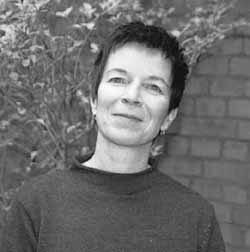Ellsworth Explores the Limits of Education—and Beyond—in Sachs Lectures
Elizabeth Ellsworth, a leading proponent of using media to enrich learning experiences and foster social change, is the 2002-2003 Julius and Rosa Sachs Distinguished Lecturer.
From 1984 to 2002, Ellsworth taught courses in educational media, cultural studies, and pedagogy at the University of Wisconsin. During the past two years, she has served as both Visiting Professor in TC's Philosophy and Cultural Studies Programs and Director of Educational Programs for TC Innovations, as well as Vice President of Research and Development for Rethinking, an educational media startup. She has also applied her expertise in pedagogical design as a consultant to Chicago's Museum of Science and Industry, and the Illinois Institute of Design. A recipient of grants and awards, Ellsworth has published numerous articles and four books, including Teaching Positions: Difference, Pedagogy, and the Power of Address (Teachers College Press, 1997).
Collectively titled, "Around and About the Limits of Education," Ellsworth's three Sachs lectures incorporate a rich array of still and video images, sounds, architectural designs and other multimedia aids. Her purpose, she says, is "to step outside the traditional boundaries of education to examine experiments, inventions and environments with the potential to enrich and expand pedagogy."
In her first lecture, "The Power of What We Can't Know," given on December 4th in Milbank Chapel, Ellsworth noted that "most of the people responsible for these innovations aren't educators per se, but architects, designers, artists, performance artists and others." Nonetheless, all have referred, at least in passing, to the role of pedagogy in their work. And all, intentionally or otherwise, have drawn upon the concept of "transitional space," which psychologist D.W. Winnicott described as "the space between inner and outer world, which is also the space between people-the transitional space-where intimate relationships and creativity occur."
"It's difficult to talk about transitional space because it is so non-linear, and you certainly can't orchestrate a transitional space," Ellsworth said. "It happens as a surprise, and becomes evident only after the fact." A case in point: architect Maya Lin's design of the Vietnam Veterans Memorial in Washington.
"Two things have to happen for people to experience something like a veterans memorial as a transitional space," Ellsworth said. "They have to encounter a physical site in the outside world-in this case, walls of granite inscribed with names-and they have to put it to use in a way that has meaning for them. Maya Lin can't take me by the hand and get me to heal, or understand the war. She can offer the wall to me and, when I come to it, allow me to creatively use it in a way that transforms my understanding."
Winnicott argued that it is impossible for a psychologist, teacher or parent to know exactly how children will create transitional space as they learn, grow and become more sophisticated in interacting with the world. "One implication is that pedagogy has its own time and space," Ellsworth said. "You can't force it to fit into impinging forms and structures. It needs to be fluid and able to shape-shift in response to the child's interests, desires, and memories-and the teacher's as well."
Elizabeth Ellsworth will deliver the second and third Sachs Lectures-"Time, Space and Place in Teaching and Learning" and "Reorienting Education"-on January 27 and February 12 respectively. They will be covered in future issues of Inside TC.
Published Thursday, Feb. 27, 2003
